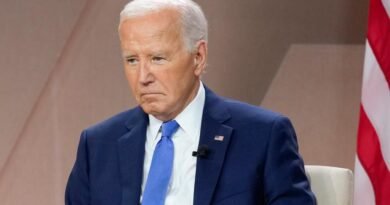Commentary on Kamala Harris’ False Fascism Claim in the 100-Year Holy War

Foreign desk: The 100-Year Holy War
“For the belligerents” behind Oct 7., notes Eli Lake at The Free Press, the attack was “not about a country” but about “an ancient city”: Jerusalem. “If you listen to Hamas, they’ll tell you that there is a plot by the Jews to destroy” the Al-Aqsa mosque, one of the holiest sites in Islam, “and build a third Jewish Temple where it now stands.” This lie “is not about Islam or even a mosque. Rather it is a rejection of any Jewish connection to Jerusalem. It is a rejection of any Jewish state at all. But what has 100 years of jihad accomplished for the Palestinian people?” “The campaign to destroy the world’s only Jewish state has only extinguished the prospect of building a Palestinian one.”
Conservative: Kamala’s False Fascism Claim
“It’s hard to know what’s worse about Kamala Harris agreeing that Donald Trump is a fascist,” fumes Spiked’s Brendan O’Neill. Harris agreed with Charlamagne tha God’s suggestion “that Trump’s vision for America is ‘about fascism.’ ” The media elite were elated as she gave “them permission to substitute name-calling for serious debate.” Their attack not only served to “exaggerate the threat of Trumpism” but “also relativised the crimes of Nazism.” Yet while “screaming ‘fascist’ at Trump,” they’re “ignoring” the truly disturbing antisemitism on America’s streets. “After Hamas’s pogrom against Israel,” it wasn’t Trump voters who “harassed Jewish students” or who committed “fascistic horrors” over the past year in America. “The truth is that it wasn’t Trump who made America feel like a hostile place for Jews – it was Trump haters.”
From the right: Is Trump the Path to Normalcy?
While “many in the Beltway view Donald Trump as the personification of dire political disruption,” Unherd’s Fred Bauer observes: “A series of recent polls suggest that many swing voters may see something else entirely in Trump: the potential for normalcy.” Battleground-state polling “from The Wall Street Journal gives Trump an edge over Harris on immigration and the economy,” and “found that voters favoured him on foreign affairs, too.” But if the “supply-chain crunches, a spike in consumer costs, and cascading crises abroad” that “soured voters on Biden” were to return “in a second Trump administration, Republicans could pay a high political price.”
Migrant beat: Meloni’s Example for Europe
Italian Prime Minister Giorgia Meloni’s strategy to reduce illegal immigration by sending “migrants picked up by Italian naval and coastguard vessels” to Albania, then “send most back to their countries of origin” is winning notice from among other European leaders, reports Nicholas Farrell at The Spectator. “Meloni has been adamant: the only way to stop illegal migrants is to stop them getting to Europe,” because “however bogus” refugee claims might be, “once they’re in the EU it’s virtually impossible to deport them.” Critically, Meloni’s plan is also “a deterrent” to future migrants. Some 15 “EU governments out of 27 have already” urged “the introduction of an EU-run equivalent scheme.” “It is potentially a game-changer, particularly as voter fury across Europe forces politicians to do something to stop illegal migrants.”
Eye on Iran: Time for Regime Change
After “Iran launched nearly 200 ballistic missiles against Israel” on Oct. 1, “a large-scale Israeli response seems inevitable now,” predicts Shay Khatiri at The Hill. “Anti-Zionism and anti-Americanism have long been central to the ideology of the Islamic Republic of Iran.” Since “U.S. policy has consistently underestimated this ideological drive,” it “has rightly provided military support to Israel while failing to take adequate measures to curb Iran’s military ambitions,” facilitating “Iran’s militarization through sanctions relief and the release of frozen assets.” Now Washington should “adopt a more proactive stance toward regime change in Iran.” It “must accept that, due to its own policies, a war between Iran and Israel became inevitable”; happily, “this moment also represents the most significant opportunity for the greatest change in the region since 1979.”
— Compiled by The Post Editorial Board



